
|
Astronomy Picture Of the Day (APOD)
 Epimetheus and Janus: Interchangeable Moons of Saturn
Epimetheus and Janus: Interchangeable Moons of Saturn
2.11.2005
These two moons change places. Epimetheus and Janus, two small moons of Saturn, actually switch positions as they orbit their home planet. The orbital radii of the moons are strangely separated by less than the radii of the moons themselves: about 50 kilometers. One moon orbits Saturn well ahead of the other, at first.
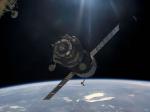 A Soyuz Spacecraft Approaches the Space Station
A Soyuz Spacecraft Approaches the Space Station
1.11.2005
Last month, a Soyuz TMA-7 spacecraft docked with the International Space Station. The spacecraft was launched a few days earlier from the Baikonur Cosmodrome in Kazakhstan. Pictured above, the approaching Soyuz spacecraft carried the new Expedition 12 crew to the Earth-orbiting International Space Station (ISS), as well as fee-paying spaceflight participant.
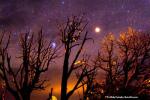 A Martian Halloween
A Martian Halloween
31.10.2005
From sunset to sunrise, an unusually bright yellowish orb will hang in the sky this Halloween: Mars. Yesterday, Earth passed Mars as they orbited the Sun, bringing Mars closer than it will be for the next thirteen years. Tonight though, Mars will be nearly as bright as last night, a beacon of extraterrestrial spookiness.
 A Dark and Stormy Night
A Dark and Stormy Night
30.10.2005
It was a dark and stormy night. But on 2003 August 29th the red planet Mars, near its closest approach to Earth in almost 60,000 years, shone brightly in the sky against a background of stars in the constellation Aquarius.
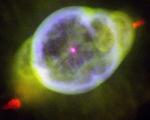 NGC 3242: The Ghost of Jupiter
NGC 3242: The Ghost of Jupiter
29.10.2005
After a star like the Sun completes fusion in its core, it throws off its outer layers in a brief, beautiful cosmic display called a planetary nebula. NGC 3242 is such a planetary nebula, with the stellar remnant white dwarf star visible at the center.
 October Mars
October Mars
28.10.2005
This October, Mars has become a bright, yellowish star in planet Earth's sky as it approaches oppositon, the period when Mars and Earth pass close as they orbit the Sun. How close is Mars? A mere 70 million kilometers or so, close enough to allow Earth-bound astronomers excellent views of the alluring Red Planet.
 The Last Titan
The Last Titan
27.10.2005
On October 19th, a rocket blasted off from Vandengberg Air Force Base - the last Titan rocket. Carrying a payload for the US National Reconnaissance Office, the successful Titan IV B launch brings to a close the Titan program whose first launch was in 1959.
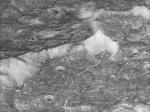 4500 Kilometers Above Dione
4500 Kilometers Above Dione
26.10.2005
What does the surface of Saturn's moon Dione look like? To find out, the robot Cassini spacecraft currently orbiting Saturn flew right past the fourth largest moon of the giant planet earlier this month. Pictured above is an image taken about 4,500 kilometers above Dione's icy surface, spanning about 23 kilometers.
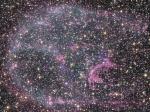 Supernova Remnant N132D in Optical and X Rays
Supernova Remnant N132D in Optical and X Rays
25.10.2005
Thousands of years after a star exploded, its expanding remnant still glows brightly across the spectrum. Such is the case with N132D, a supernova remnant located in the neighboring Large Magellanic Cloud (LMC) galaxy. The expanding shell from this explosion now spans 80 light-years and has swept up about 600 Suns worth of mass.
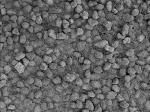 Angular Sand on Martian Hills
Angular Sand on Martian Hills
24.10.2005
Why isn't this sand round? The robotic Spirit rover currently rolling across Mars has found notably angular sand in the Columbia Hills on Mars. Previously, small bits of sand found in the plains of Gusev Crater were significantly more round.
|
January February March April May June July August September October November December |
||||||||||||||||||||||||||||||||||||||||||||||||||||||||